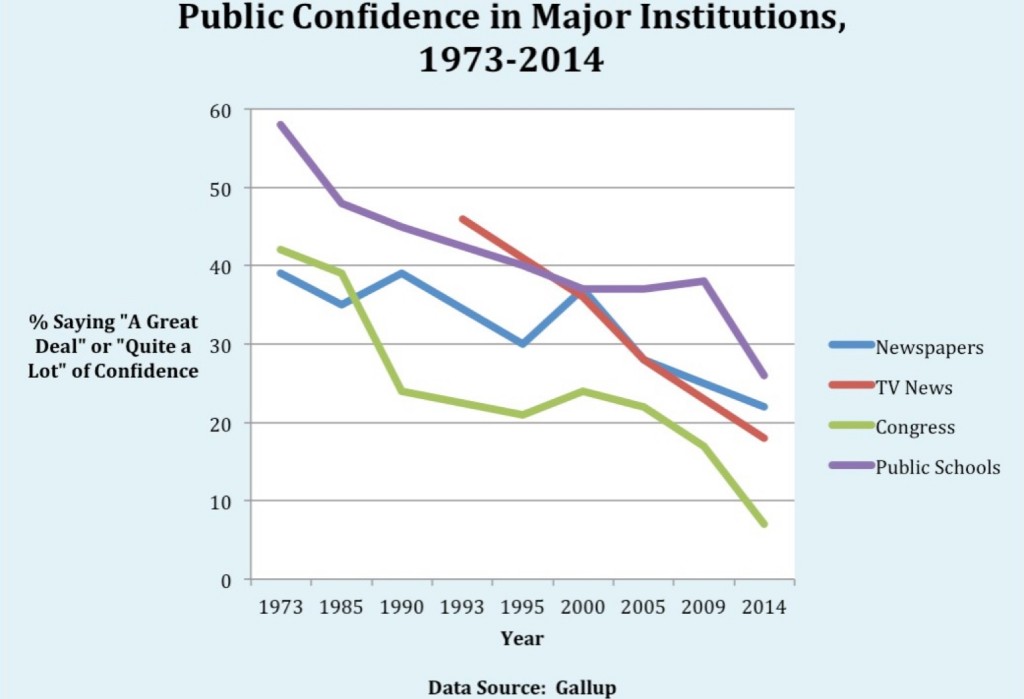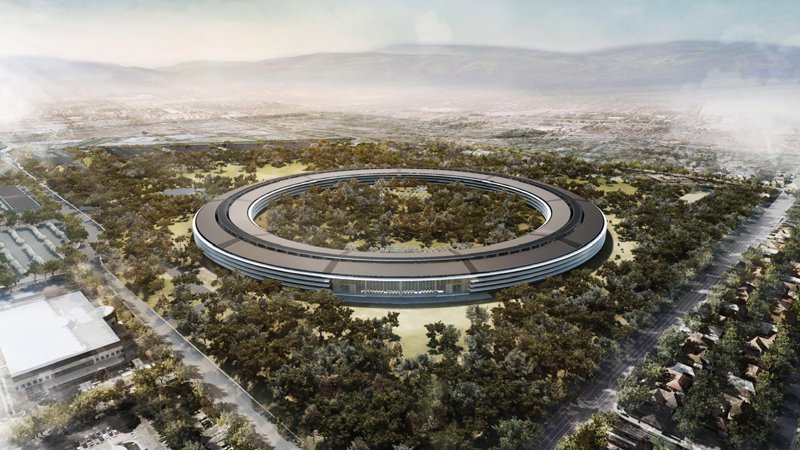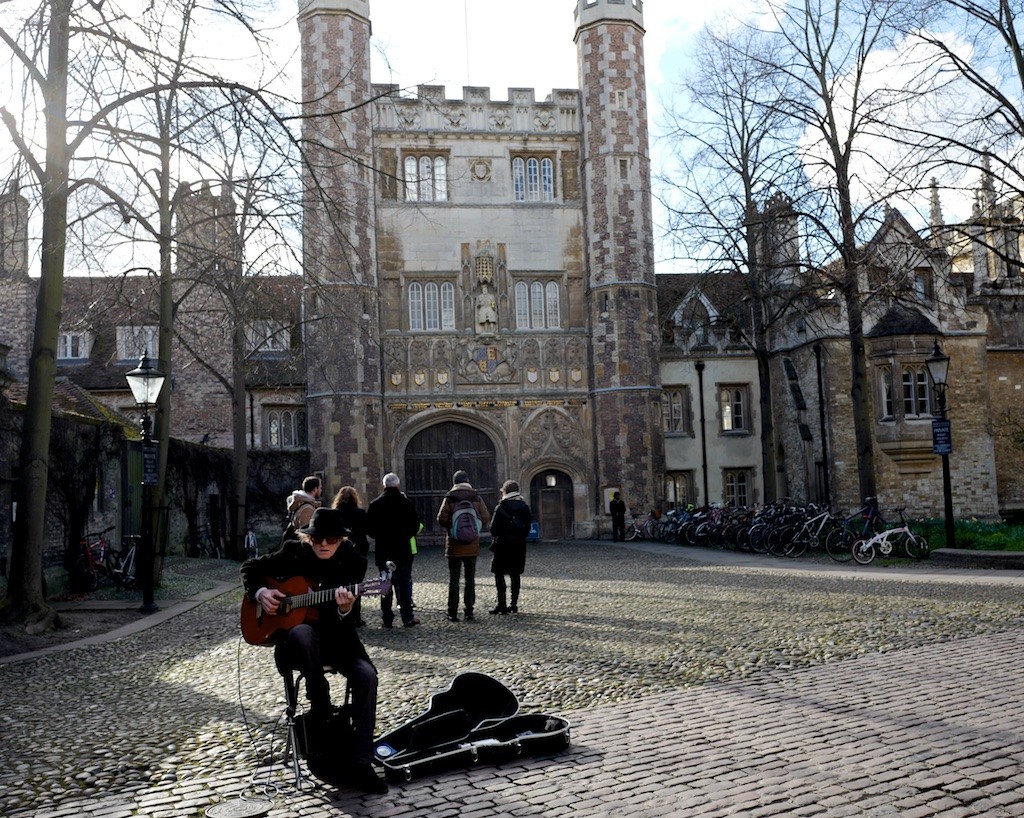Nicholas Kristof, a New York Times columnist whose work I admire, recently wrote an apologia arguing that he and his media colleagues are responsible for Donald Trump’s ascendancy. His message is: we screwed up. He lists four particular failures:
- Shortsighted exploitation of the fact that Trump makes ideal clickbait (Kristof quotes Ann Curry, the former Today anchor, saying that “Trump is not just an instant ratings/circulation/clicks gold mine; he’s the motherlode”)
- Failure to provide “context in the form of fact checks and robust examination of policy proposals. A candidate claiming that his business acumen will enable him to manage America deserved much more scrutiny of his bankruptcies and mediocre investing.”
- Wrongly regarding Trump’s candidacy as a farce. (“Sarah Palin received more serious vetting as a running mate in 2008 than Trump has as a presidential candidate.”)
- The fact that Mr Kristof and his peers “were largely oblivious to the pain among working-class Americans and thus didn’t appreciate how much his message resonated.”
All true, no doubt. But methinks he doth protest too much, as Shakespeare would have put it. My hunch is that, even if mainstream media had not fallen into the aforementioned traps, Trump would have been in the ascendant simply because our media ecosystem has dramatically changed, and the mainstream media are no longer the ‘gatekeepers’ they once were.
That’s not to say that such media aren’t still important, just that they’re less central to public discourse than they used to be. They don’t control the narrative any more, determining — for example — what can or cannot be said in public on television. (Which may explain why some commentators have been so shocked at the depths to which the Republican primary ‘debates’ have sunk. I mean to say, candidates for the Presidency of the United States arguing over who has the biggest dick and the sluttiest spouse.) Sacre Bleu!
Cue for a nostalgic rant about the lost golden age of television?
Absolutely not. Repeat after me: there never was a golden age. Never has been, and especially not in journalism. If you want an illustration, just think back to another fractious presidential election — that of 1968, when the US was roiling in controversy over the Vietnam War. As the party conventions loomed, ABC News, then the smallest of the three big American TV networks and struggling in the ratings war, came up with the idea of having a series of short, live ‘debates’ between two celebrated public intellectuals of the time — the conservative columnist William F. Buckley, Jr. and the novelist Gore Vidal. The idea was that the two would have a televised argument every evening while the conventions were in progress and the great American public would be entertained and edified by watching these two great minds locked in argument.
In the event, it turned out not to be an edifying spectacle. We know this because it was later exhumed by Robert Gordon and Morgan Neville, who made an instructive documentary film about it entitled “Best of Enemies”. The mutual loathing between the two men was evident from the beginning. Both were scions of the WASP establishment and spent most of the time not discussing issues but trading personal insults in a stylised, stilted, pseudo-ironic tone which looks entirely phoney when viewed from today’s perspective.
The Republican convention, held in Miami that year, was a relatively low-key affair which nominated Richard Nixon as the candidate with Spiro Agnew as his running mate. (In the context of Trump & Co, just ponder that pairing for a moment and then rank it on the absurdity scale.)
The 1968 Democratic convention, however, was an entirely different affair. The country (and the Democratic party) was still reeling from the assassinations of Martin Luther King in April and Robert Kennedy in June. RFK’s death left his delegates uncommitted in the run-up to the convention. President Lyndon Johnson had decided that he was not going to seek nomination, which meant that the contest was between the establishment’s candidate, Hubert Humphrey, and Eugene McCarthy, the anti-war candidate. The Chicago mayor, Richard Daley, had put the city on a wartime footing in anticipation of popular protests and demonstrations by anti-war activists. The stage was set for an epic and violent confrontation — which duly materialised on lines most recently witnessed in contemporary Turkey.
The climactic moment of the Buckley-Vidal debates came after the moderator, Howard Smith, referred to the fact that some of the anti-war demonstrators in Grant Park had brandished Vietcong flags prior to the onslaught on them by Daley’s cops. Here’s the transcript of what happened as published by the New Yorker:
SMITH: Mr. Vidal, wasn’t it a provocative act to try to raise the Vietcong flag in the park in the film we just saw? Wouldn’t that invite—raising the Nazi flag during World War II would have had similar consequences.
VIDAL: You must realize what some of the political issues are here. There are many people in the United States who happen to believe that the United States policy is wrong in Vietnam and the Vietcong are correct in wanting to organize their own country in their own way politically. This happens to be pretty much the opinion of Western Europe and many other parts of the world. If it is a novelty in Chicago, that is too bad, but I assume that the point of the American democracy…
BUCKLEY: (interrupting): — and some people were pro-Nazi—
VIDAL: — is you can express any view you want—
BUCKLEY: — and some people were pro-Nazi—
VIDAL: Shut up a minute!
BUCKLEY: No, I won’t. Some people were pro-Nazi and, and the answer is they were well treated by people who ostracized them. And I’m for ostracizing people who egg on other people to shoot American Marines and American soldiers. I know you don’t care—
VIDAL (loftily): As far as I’m concerned, the only pro- or crypto-Nazi I can think of is yourself. Failing that…
SMITH: Let’s, let’s not call names—
VIDAL: Failing that, I can only say that—
BUCKLEY (snarling, teeth bared): Now listen, you queer, stop calling me a crypto-Nazi or I’ll sock you in your goddam face, and you’ll stay plastered—
(Everybody talks at once. Unintelligible.)
SMITH: Gentlemen!
Gentlemen! I don’t think so. The film makes the point that Buckley never quite recovered from the exchange, not because he lost the argument, but because he lost his cool and was reduced, momentarily, to behaving like a saloon-bar drunk. This rather undermined his carefully-constructed public persona of a leisurely, superior toff. And it was doubtless reinforced by the amused, contemptuous smirk with which Vidal greeted his outburst.
But who really won? — if that is a meaningful question about a high-class brawl. The answer, suggests John Powers in a thoughtful comment, is that it turned out to be a draw in the long run.
Forty-seven years on, it’s clear that Buckley’s conservatism won the political battle — his free-market, anti-government ideas now dominate. Culturally, though, Vidal’s values won — not least his libertarian, label-free ideas of sexuality. One imagines Buckley blanching at the right to gay marriage or at the triumph of hip-hop.
And who leaves the greater legacy? Powers again:
At the moment, the nod goes to Buckley, who led a movement that demonstrably changed how America thinks and organizes itself, even if it’s hard to imagine any of his writings lasting as more than mere documents. In contrast, Vidal’s influence on American life was minor, yet he was a vastly more talented writer, whose novels about our past, like Burr and Lincoln, may give him an enduring fame that will outlast Buckley’s.
The strange thing about the debates, though, is how contrived and phoney they seem to the contemporary eye (and ear). They leave one wondering if this was really what passed for high-class intellectual chat in the Golden Age of American network television. If so, then all they demonstrate is that there never was a golden age.



